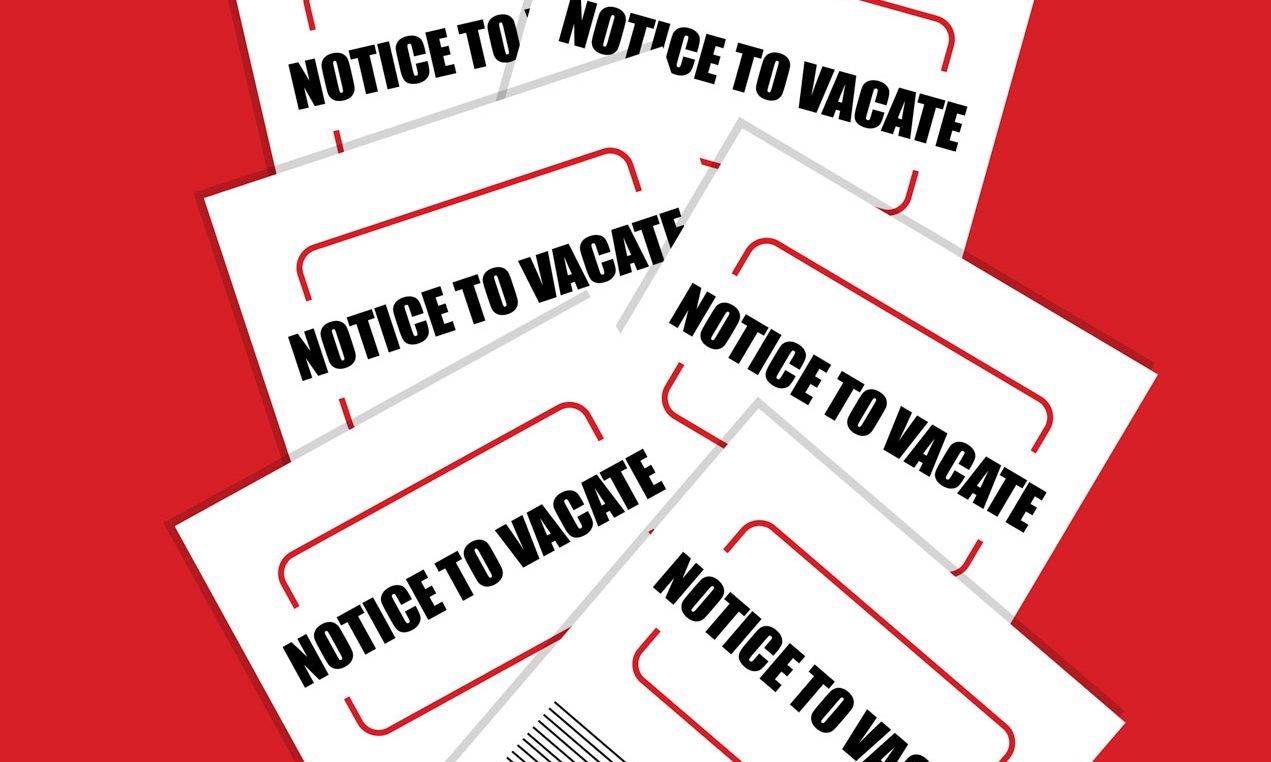 Photo & Illustration by Jessica Turner.
Photo & Illustration by Jessica Turner.
One day near the end of 2021, attorney Mark Melton sat in a Dallas County Justice of the Peace courtroom, where he had spent untold hours that year.
He had four clients on a docket of 30 or 40. It was a typical schedule for the transactional tax lawyer who became Dallas’ most prolific eviction specialist during the pandemic.
He watched a young woman approach the judge. She shakily said she didn’t think her landlord had given her proper notice before evicting. The judge said he was sure she did not know the law, and he would not accept this defense. Before ruling for the landlord, he told her to be less stupid the next time she was in his court, Melton recounts.
“She was 100% right,” he says. “They didn’t give her the proper notices.”
Melton knew as much because he had already won three cases on the same argument for other defendants living in her complex.
This was a particularly frustrating example, Melton says, but people with a valid defense are evicted every day. They wind up on the street because they do not have anyone to advocate on their behalf.
“We have these laws that are supposed to protect landlords and tenants, and the landlord seems to get the benefit of those protections almost every time,” Melton says. “And the tenants get the benefit of those almost never.”
Evictions are a necessary part of property management, and landlords are entitled to be paid or get their property back, but they also should follow the law, Melton says.
Since founding the Dallas Eviction Advocacy Center during the height of the coronavirus pandemic, Melton and his team have recorded a 96% rate of success in keeping clients facing eviction in their homes. In most of those cases the landlords and justices of the peace had not followed rules related to notices, Melton says.
“The difference between having two weeks to find new housing because you were given proper notice and having two days — that’s a significant amount of time that will keep a lot of people off the streets and bridges,” Melton says. “I view our role as a group of attorneys making sure that the law is being followed. Nothing more, nothing less.”
They couldn’t look the other way
In early 2020, eviction filings in Dallas County were 15% to 20% above historic averages, a trend consistent with much of the country, according to researchers at Princeton’s Eviction Lab. As part of the effort to slow the spread of the coronavirus, the Centers for Disease Control and Prevention enacted a moratorium that March temporarily preventing nonpayment evictions.
Eviction filings dropped dramatically, but Melton realized people struggling to pay rent were still receiving eviction notices. Desperate tenants were posting about it on Facebook.
Regular work at the international firm, where he is a partner and transactional tax-law expert, was slow, so he started responding to some of them.
Melton’s wife, Lauren, has worked in hospitality most of her life, and the couple previously owned a restaurant. So Mark’s “little blurbs” of advice were going viral among their service industry connections.
“It just took off from there,” Lauren says.
Mark was soon inundated with emails and messages— spending some 15-18 hours a day answering them.
So Lauren jumped in to help.
“I adore my husband,” she says. “I figured if I helped it would free him up.”
She set up a Google line, a Facebook page and email address for what would become the Dallas Eviction Advocacy Center (DEAC) and began fielding requests. At first it was answering a lot of questions about the eviction moratoria and tenants’ rights. She created spreadsheets for hundreds of volunteers, and when Mark held weekly Zoom training sessions for them, she attended.
“I am no lawyer. I am a restaurant manager and a mom,” Lauren says. “I can delegate. I can organize. I can read and learn as much as I can from the training.”
As they began going to virtual and in-person hearings and observed more courtroom interactions, the Meltons began collaborating with nonprofits such as City Square and United Way that provide wraparound services for struggling renters.
“If you save someone from eviction but then they are in the same spot the next month, it doesn’t do much good,” she says.
In rare cases the Meltons have footed a hotel bill, helped families find a new apartment or offered other types of support outside the realm of the DEAC.
“I never would have expected this if you told me years ago, but we’ve made an impression on these justices and clerks, and they might call when they come across someone they think we could help,” Lauren says. “For a while I was talking to one clerk every week.”
She describes a 79-year-old widow who landed in eviction court, for example.
“We basically adopted her. She had lost her husband who she’d been married to since she was probably 18. Well, she has us now,” Lauren says with a smile.

‘Too many cases are flat out 100% wrong’
Mark has been quoted and featured in almost every recent news story about evictions in Texas. The DEAC has garnered grants and funding to hire a staff of two additional lawyers — Stuart Campbell and Jessica Vittorio — and an administrator, Stephanie Cross.
The DEAC does not take government funds because, according to Lauren, that would slow them down.
“There’s a lot of red tape that comes with government funding,” she says. “It can limit who we can help and how quickly we can help them.”
Nonprofit organizations such as Legal Aid that do receive government funding are godsends in many cases, but the process to become a client can take two weeks or more, Lauren guesses, and DEAC clients often need same-day help.
Government-funded outfits also are limited to serving only the lowest income bracket.
As Lauren points out, there is an ocean between poverty and ability to afford an attorney.
The DEAC has utilized government rental assistance funds to negotiate resolutions on behalf of clients.
The federal government allotted $50 billion for housing relief through the federal Coronavirus Aid Relief and Economic Security Act. It’s been up to local governments to get those funds to organizations and people who need them.
In December The Advocate reported that almost any tenant in Dallas County facing eviction for nonpayment could receive rental assistance, and property managers and The Apartment Association of Dallas were involved in the effort to get this information to tenants.
As those funds dry up, that path to preventing evictions will dissolve. But the number of “bad rulings” in Texas justice of the peace courts won’t, Mark says.
“There are too many cases that are flat out 100% wrong on the law,” he says.
While waiting for one of her two or three clients on a given day, DEAC staffer Jessica Vittorio says she might watch 30 people get evicted — “people we could have helped because the proper notices were not given.”
Over the months, Dallas justices of the peace have become accustomed to seeing Vittorio, Stuart Campbell and Melton in court. Judge Juan Jasso, Precinct 5, says he’s happy to see the DEAC associates.
“Even if there is a person (Mark Melton) isn’t representing, he’ll pipe up and say, ‘I can talk to him afterward,’” Jasso says. “Or say someone’s having trouble with the rental assistance they applied for, and I will crane my neck and say, ‘Mr. Melton, do you think you can assist this person?’”
Jasso says he sees both sides. Landlords must continue to pay their mortgages, taxes and utility bills, he says. He has been heartened by their willingness to work with tenants, helping them with paperwork. “Of course they realize it is to their benefit,” the judge allows.
DEAC lawyers today say they are handling a lot of appeals. They point out that even with a pauper’s affidavit, defendants have to pay one month’s rent to stall an eviction through appeal.
That makes appealing an eviction financially impossible for most defendants, including the young defendant who lost her case because she was unfamiliar with the particulars of the notice-to-vacate law.
Mark Melton says that after the judge told her to “be less stupid,” the woman had turned on her heel, muttering “I think you’re stupid” under her breath. He followed her out of the courtroom and offered to help. Campbell is handling her appeal.
Justice in ‘normal times’
Gathered around the kitchen table at the Meltons’ East Dallas home in early January, the DEAC team jokes that Campbell is the group’s most-likely-to-be-thrown-in-jail on contempt.
“Stuart almost went to jail last week because he had the unmitigated nerve to show the judge a copy of the statute and say, ‘here’s the law,’” Mark quips.
“Yeah, he told me he was quite familiar with the law and still decided against me because ‘he can,’ and when I asked him to explain he said he ‘didn’t have to,’” Campbell says.
Mark Melton half-jokes that he plans to write a book entitled Injustice of the Peace.
The group is discussing next steps and the growing need for their services.
Someone recently asked the Meltons what would happen if, post COVID, people did not need their help. After all, the couple — parents to four children — had invested a good portion of their lives in this pandemic-prompted nonprofit.
Their response: If it ever got to a point where landlords and judges were following protocol and evictions were all by the book, they would be thrilled. And shocked.
Initially, they thought it would last a few months and life would return to normal. But that did not happen. Meantime, Mark Melton says he’s realized the issue is not specific to the pandemic.
“The thing that I’ve learned in the last eight months was the vast number of tenants that get railroaded inside eviction courts,” he says.
The whole group agrees that too often not following the right procedure is industry practice, and they feel a responsibility to change that.
“Just in general, there is a complete miscarriage of justice,” Mark concludes. “I think our role in this is not just to stand in during a worldwide pandemic, but just in normal times.”
For help or to volunteer with the Dallas Eviction Advocacy Center, click here, email info@dallaseac.org or call 469.436.2704.





